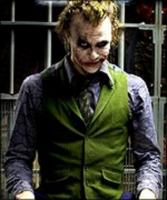Heath Ledger’s Joker
Published by marco on
Much has been said of Heath Ledger’s portrayal of the Joker in The Dark Knight. Many have drawn parallels between elements in the movie and the recent history of the United States, from the attacks of 9–11 to the ensuing war on terror and its effects, both foreign and domestic. The Joker is chosen as the terrorist and the only way to stop him is to be just as lawless, to forsake all that you are defending—if only for just a little while, until order is restored—before everything you hold dear slips away on the raging river of anarchy brought forth into the world by him. Some see the film as a critique of this line of reasoning whereas others see it as a recognition of its inevitability. These interpretations, however, try too hard to map the film onto their own personal worldview and miss the none-too-subtle point that was expressed in no uncertain terms by the Joker himself during the film: “Introduce a little anarchy. Upset the established order, and everything becomes chaos. I’m an agent of chaos.”. This citation from At the Movies by Michael Wood (London Review of Books), seems to understand the crux of the matter very well:
“By turns authoritative and wheedling, often speaking casually, with long pauses, as if talking to himself, always acting, aware of circumstance and timing, and very rarely manic […] he creates a character who is attractive and horrifying in exactly the right proportions: attractive because horrifying, perhaps. Even his rages seem parodies of rages. He projects an enduring sense of calm beneath his craziness, so that you have to admire his poise even as you wish he had never been invented. […] the Joker makes even evil seem a puzzle too easily solved because there is nothing he can’t make a joke of, and because, unlike Batman, he is not the prisoner of a traumatic past but the inventor of one: he can have any past he likes. Any future too. It’s striking that several people in the movie call him a terrorist, an appropriate term only in a very loose sense. He certainly terrorises people, in the movie and in the cinema. But terrorism, strictly, is a political weapon, and the Joker doesn’t have any politics, any more than he has any morals. […] He is not only someone we don’t understand, he is the image of everything we don’t understand, a travesty of highly intelligent, meaningless design.”
Try as one might, there is no way to ascribe terrorist acts to the Joker without bending the definition beyond all recognition. He has no credo, no goal; the scene in the road—where Batman screamed up the road on his motorcycle at the Joker—showed that the Joker truly didn’t whether he lived or died. To him, the worth of every moment was determined by its entertainment value, not by any contribution it made to a higher purpose.
Most terrorists can be thwarted by defusing the situation that drove them to acts of desperation. We do ourselves a disservice by lumping in the majority of the redeemable with the extreme minority of the truly insane. When the Joker got a heap of money, he burned it—perhaps because he was truly around the bend and doesn’t share any morés with Western society, or perhaps because he saw it as a lever by which he could be controlled were he to become attached to the idea of being wealthy. The Joker says during his interrogation that he has nothing that the Batman can take from him, but the Joker is a work of fiction. Most people—even terrorists—are not like that; most people have levers by which they can be controlled[1].
Casting the Joker as a terrorist in an attempt to substantiate a worldview that incorporates only black and white credos is to do a great disservice to both Frank Miller—who created this darker, subtler vision of Gotham inhabited by an amoral Joker and a tortured Batman—and to Heath Ledger, who transformed himself utterly to portray a personality found exceedingly rarely[2], if ever, in real life. The world is composed of shades of gray. We Americans have already ruined our political process with our refusal to assimilate this fact; let’s not ruin our cinema as well.
